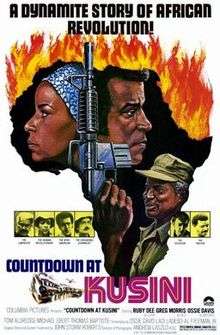Countdown at Kusini
Countdown at Kusini (also known as Cool Red) is a 1976 American-Nigerian action/drama film written by Howard Friedlander and Ed Spielman, and directed by Ossie Davis.
| Countdown at Kusini | |
|---|---|
 | |
| Directed by | Ossie Davis |
| Produced by | Ladi Ladebo |
| Written by | Ossie Davis Al Freeman Jr. Ladi Ladebo John Storm Robert |
| Starring | Ruby Dee Ossie Davis Greg Morris |
| Music by | Manu Dibango |
| Cinematography | Andrew Laszlo |
| Edited by | George Bowers |
Production company | DST Telecommunications Nigeria Glipp Productions Tam International Limited |
| Distributed by | Columbia Pictures |
Release date |
|
Running time | 101 minutes |
| Country | Nigeria United States |
| Language | English |
| Budget | $1.2 million[1] |
Synopsis
During a trip to the newly independent nation of Fahari, Africa, Red Salter, an African American jazz musician, falls in love with Leah Matanzima, but she is involved in Fahari's struggle against a puppet government run by multinational corporations. Jealous of Leah's friendship with white British journalist Charles Henderson, Red reluctantly joins her support of revolutionary leader Ernest Motapo and helps her obtain guns from weapons dealer Saidu. When Fahari officials arrest them, Charles rescues Leah and Red; then spirits them away in a motorboat, but Ben Amed, a French mercenary hired to assassinate Motapo, rams them with another boat and kills Charles. Marnie (Yola), Motapo's traitorous nephew, arranges with Amen to ambush Motapo at a railroad junction near Kusini, but Leah and Red arrive in time with revolutionary fighters. After killing Marnie and Amed, Leah welcomes Red to Africa's revolution against European imperialism.[1]
Cast
- Ruby Dee - Leah Matanzima
- Ossie Davis - Ernest Motapo
- Greg Morris - Red Salter
- Tom Aldredge - Ben Amed
- Michael Ebert - Charles Henderson
- Thomas Baptiste - John Okello
- Jab Adu - Juma Bakari
- Elsie Olusola - Mamouda
- Funsho Adeolu - Marni
- Ibidun Allison - Sniper
Production
The film was conceived and entirely financed by Delta Sigma Theta, an African-American sorority that owned DST Telecommunications which produced material to counter the “inaccurate portrayal of black people in media.”[1]
Filming took place in August 1974 in Lagos, Nigeria with both U.S. and Nigerian crews.[1]
Dee, Davis and Morris deferred their salaries until the film made a profit.[1]
References
External links